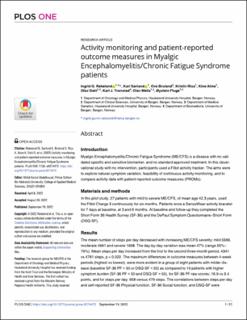| dc.description.abstract | Introduction: Myalgic Encephalomyelitis/Chronic Fatigue Syndrome (ME/CFS) is a disease with no validated specific and sensitive biomarker, and no standard approved treatment. In this observational study with no intervention, participants used a Fitbit activity tracker. The aims were to explore natural symptom variation, feasibility of continuous activity monitoring, and to compare activity data with patient reported outcome measures (PROMs).
Materials and methods: In this pilot study, 27 patients with mild to severe ME/CFS, of mean age 42.3 years, used the Fitbit Charge 3 continuously for six months. Patients wore a SenseWear activity bracelet for 7 days at baseline, at 3 and 6 months. At baseline and follow-up they completed the Short Form 36 Health Survey (SF-36) and the DePaul Symptom Questionnaire–Short Form (DSQ-SF).
Results: The mean number of steps per day decreased with increasing ME/CFS severity; mild 5566, moderate 4991 and severe 1998. The day-by-day variation was mean 47% (range 25%–79%). Mean steps per day increased from the first to the second three-month period, 4341 vs 4781 steps, p = 0.022. The maximum differences in outcome measures between 4-week periods (highest vs lowest), were more evident in a group of eight patients with milder disease (baseline SF-36 PF > 50 or DSQ-SF < 55) as compared to 19 patients with higher symptom burden (SF-36 PF < 50 and DSQ-SF > 55), for SF-36 PF raw scores: 16.9 vs 3.4 points, and for steps per day: 958 versus 479 steps. The correlations between steps per day and self-reported SF-36 Physical function, SF-36 Social function, and DSQ-SF were significant. Fitbit recorded significantly higher number of steps than SenseWear. Resting heart rates were stable during six months.
Conclusion: Continuous activity registration with Fitbit Charge 3 trackers is feasible and useful in studies with ME/CFS patients to monitor steps and resting heart rate, in addition to self-reported outcome measures. | en_US |

